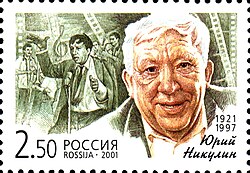Yuri Vladimirovich Nikulin (Russian: Юрий Владимирович Никулин; 18 December 1921 – 21 August 1997) was a well-known Soviet and Russian actor and clown who starred in many popular films.
He was awarded the title of People's Artist of the USSR in 1973 and Hero of Socialist Labour in 1990. He also received a number of state awards, including the prestigious Order of Lenin, which he received twice in his lifetime.
Nikulin was born just after the end of the Russian civil war, in Smolensk in Western Russia. His mother was a garage supervisor and his father a writer of satirical plays – "a profession which may have influenced [Nikulin's] future career". Nikulin fought in the Red Army in the Winter War with Finland and the World War II with Germany. He reportedly had a comparably "long period of military service, from 1939 to 1946, preparing to be demobilised just when the German invasion of the Soviet Union began in 1941.
He was awarded the title of People's Artist of the USSR in 1973 and Hero of Socialist Labour in 1990. He also received a number of state awards, including the prestigious Order of Lenin, which he received twice in his lifetime.
Nikulin was born just after the end of the Russian civil war, in Smolensk in Western Russia. His mother was a garage supervisor and his father a writer of satirical plays – "a profession which may have influenced [Nikulin's] future career". Nikulin fought in the Red Army in the Winter War with Finland and the World War II with Germany. He reportedly had a comparably "long period of military service, from 1939 to 1946, preparing to be demobilised just when the German invasion of the Soviet Union began in 1941.
Career
Nikulin first took up clowning in 1944 when a political officer in his battalion, impressed by his repertoire of jokes, ordered him to organize entertainment for the division, which he did with resounding success. Encouraged, once the war ended, Nikulin reportedly "tried unsuccessfully to enter drama college before answering a newspaper advertisement recruiting trainees for the Clown Studio at Moscow's Tsvetnoy Boulevard Circus." The several acting schools and theatres rejected Nikulin allegedly due to "lacking artistic talent". However, he did find initial success at the Circus and qualified as a fully trained clown in 1950, and never abandoned his links with the circus. He met his wife, Tatyana, there, and in 1982 became the director of the Moscow Circus, a post he held until his death. His son, Maxim, is now a circus administrator.
His screen debut came in 1958 with the film The Girl with the Guitar. He appeared in almost a dozen major features, mainly in the 1960s and 1970s, "but his ascent to star status was assured by a handful of short films directed by Leonid Gaidai." The first two of these, Dog Barbos and Unusual Cross and later Bootleggers (Russian: Samogonchiki or The Moonshine Makers, 1961) were also where Nikulin was featured as a character named Fool in a Marx Brothers-like trio, along with Georgy Vitsyn as Coward and Yevgeny Morgunov as Experienced. In former Soviet republics he is particularly well known for his role in popular film series about the criminal trio. The series included such films as Operation Y and Other Shurik's Adventures and Kidnapping Caucassian Style.
His most popular films include comedies Brilliantovaia Ruka (Diamond Arm), 12 Stulyev (12 Chairs), Stariki-Razboiniki (Old Hooligans). He was also acclaimed for his roles in Andrey Tarkovsky's Andrei Rublev and several films on the World War IIthemes (Sergei Bondarchuk's They Fought for Their Country, Aleksei German’s Twenty Days Without War).
All his life Yuri Nikulin was fond of funny stories, which he started collecting while serving the army; the hobby later resulted in the TV show The White Parrot Club ("where celebrities would sit around a table telling jokes") and jest-books From Nikulin.
Nikulin was one of the "best-loved men in Russia" and his death was mourned "not just by Russians but by tens of millions in the wider Russian-speaking world from Ukraine to Kazakhstan as the actor and comic who more than any other expressed the daily woes and laughter of the Soviet Everyman."
Source: wiki/Yuri_Nikulin
























